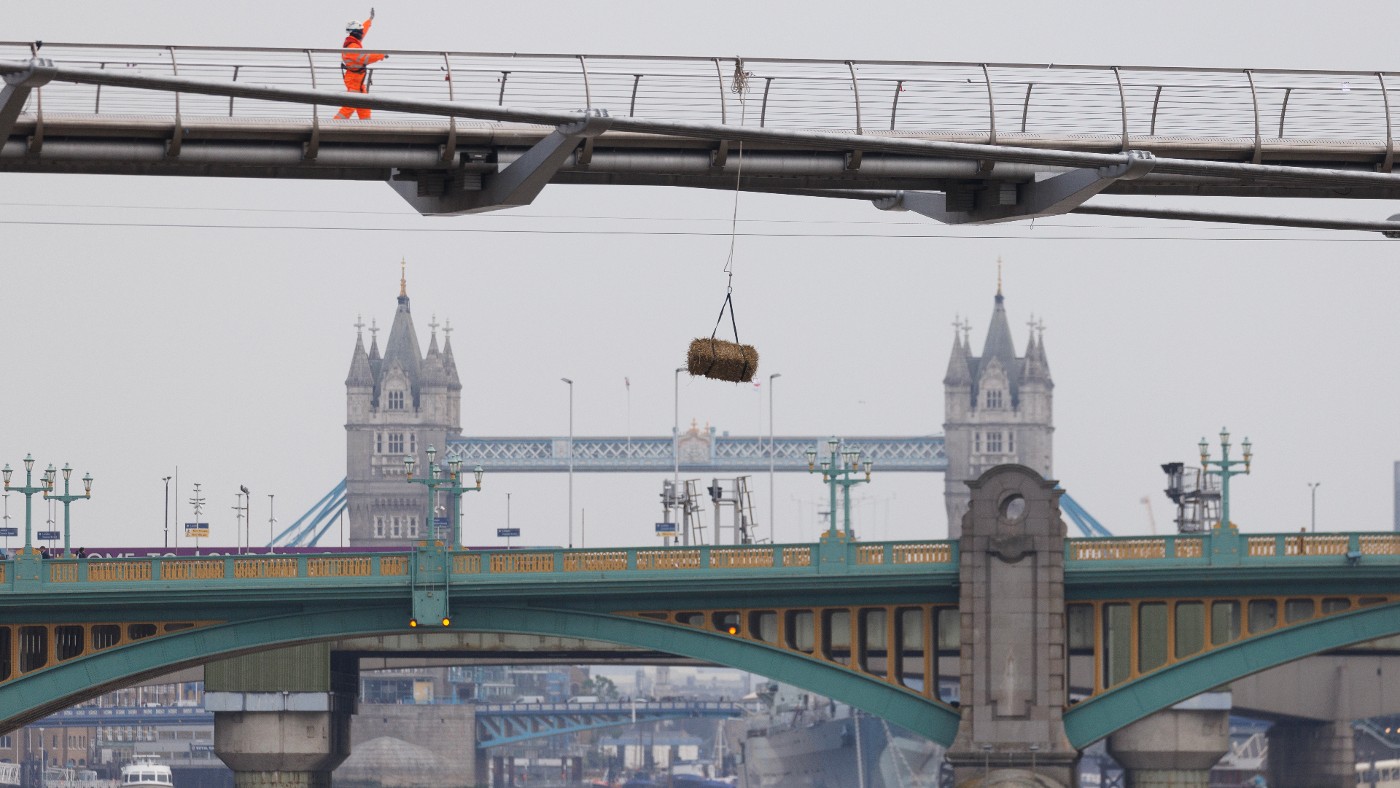France's pension protests, explained
President Macron wants to raise the retirement age. French workers say 'non merci.'


A free daily email with the biggest news stories of the day – and the best features from TheWeek.com
You are now subscribed
Your newsletter sign-up was successful
Thousands of workers have taken to the streets in France — for the second time in a month — in protest of French President Emmanuel Macron's plan to raise the retirement age. Here's everything you need to know:
What's happening?
Despite fervent public opposition, the French government is attempting to push ahead with pension reforms that would raise the retirement age in France from 62 to 64. Workers have retaliated with widespread protests in towns and cities across the country. The strikes — in which eight large unions are taking part — have heavily disrupted schools, oil refineries, and public transit. "It's not often that we see such a mass mobilization," veteran left-wing leader Jean-Luc Mélenchon told The Associated Press. "It's a form of citizens' insurrection."
This isn't the first time pensions have been a point of contention in France. Macron has been attempting to overhaul France's pension system since he was elected in 2017. And in 2010, former French President Nicolas Sarkozy sparked public outrage after he raised the retirement age from 60 to 62.
The Week
Escape your echo chamber. Get the facts behind the news, plus analysis from multiple perspectives.

Sign up for The Week's Free Newsletters
From our morning news briefing to a weekly Good News Newsletter, get the best of The Week delivered directly to your inbox.
From our morning news briefing to a weekly Good News Newsletter, get the best of The Week delivered directly to your inbox.
So is 64 an unusually-high retirement age?
No. In fact, "at 62, France's retirement age is lower than most other countries in Western Europe," reports BBC News. In Spain, the retirement age is 65; in the United Kingdom, it's 66. And in Italy and Germany, the official age is either at or moving toward 67. Macron initially wanted to raise France's minimum retirement age to 65 but backed down.
Why is the age being changed?
Macron has described his proposed reforms as "essential" to ensure the viability of France's pension system, into which there aren't enough workers paying to cover the funds being sent out to retirees. "We have a universal system, and the system has to pay for itself. If not, it's weakening and if it's weakening, at some point, people will lose their pension," said Christopher Weissberg, who serves as a member of parliament in Macron's Renaissance Party. Per Labor Ministry estimates, reforms would "yield an additional 17.7 billion euros ($19.18 billion) in annual pension contributions," Reuters summarizes.
Why are French workers so angry?
Instead of asking them to work for longer, union members and workers believe the government could raise money using a different method, like "taxing the super rich or asking employers or well-off pensioners to contribute more," Reuters writes. And further, the government's proposed reforms coincide with a broader cost of living crisis, which has already soured general public opinion.
But perhaps the driving factor at the heart of this vitriol is the particularly French tendency to frame "the well-off and their perceived allies" as the "villains" of the larger story, Pamela Druckerman muses for The Atlantic. And "on the pension debate, all of this translates into a belief that the government wants workers to absorb the pain, while sparing the wealthy." The French are rather sensitive to work-related controversy for reasons that stem back to the French Revolution, "which enshrined the fact that, when you're able to sell your capacity to work, you're a free citizen," sociologist Daniele Linhart told German outlet DW. "Work has become a symbol, also in the context of class warfare, and people have fought for the right to retire at a certain age."
A free daily email with the biggest news stories of the day – and the best features from TheWeek.com
Who is right?
As with most things, it depends on who you ask. Some, like Politico's Paul Taylor and the Bloomberg editorial board, not only believe in Macron's reforms but find them to be overdue. "This reform is necessary because we need to get more people into the workforce to foster economic growth," economist Philippe Crevel told DW. "The employment rate among older people is relatively low in France compared to other countries — increasing the minimum pension would push up that rate."
Others, like French economist Michael Zemmour, believe the government is picking away at a "rather healthy" pension system to selfishly balance its own budget, and in doing so is "bit by bit … dismantling our social model." Speaking with Foreign Policy, former metal worker and protester Alain Laute alleged similarly: "The tax brackets in France are completely unfair; there is money to be found at the top," he said. "What Macron calls modernization, we call dismantling the welfare state."
What happens next?
Unless the protests somehow convince the government to drop its plan entirely, which is unlikely, the measure will go to the National Assembly in early February, Druckerman reports. It will thereafter go to a vote. If the vote fails, it's possible Macron will enact the reforms via presidential decree.
How does this play into Macron's legacy?
Macron's success in the pension fight is a "test" of what he's able to achieve in his second term after losing his majority in parliament, writes the Financial Times editorial board. "With social tensions running high during a cost of living crisis, can he modernize the country or just manage it?"
Indeed, "many experts" view the proposed reforms as a "pivotal moment" for the French president's "political identity," Michele Barbero notes in Foreign Policy. Macron "wants to show that he is capable of transforming French society, that he's not just handling the day-to-day business," French political scientist Luc Rouban told Barbero.
"Everyone wants to have a go at defeating the unions and the street so they can boast about their ability to do the toughest and most controversial reform possible," Antoine Bozio, director of the Institute of Public Policy in Paris told Bloomberg. "It's a huge risk."
Brigid Kennedy worked at The Week from 2021 to 2023 as a staff writer, junior editor and then story editor, with an interest in U.S. politics, the economy and the music industry.
-
 Companies are increasingly AI washing
Companies are increasingly AI washingThe explainer Imaginary technology is taking jobs
-
 The 9 best steroid-free players who should be in the Baseball Hall of Fame
The 9 best steroid-free players who should be in the Baseball Hall of Famein depth These athletes’ exploits were both real and spectacular
-
 ‘Bad Bunny’s music feels inclusive and exclusive at the same time’
‘Bad Bunny’s music feels inclusive and exclusive at the same time’Instant Opinion Opinion, comment and editorials of the day
-
 Bizarre pizza toppings horrify Italians
Bizarre pizza toppings horrify ItaliansTall Tales And other stories from the stranger side of life
-
 Despairing husband creates 'Taylor Swift jar'
Despairing husband creates 'Taylor Swift jar'Tall Tales And other stories from the stranger side of life
-
 Why a bale of straw is hanging from a London bridge
Why a bale of straw is hanging from a London bridgeTall Tales And other stories from the stranger side of life
-
 Is the 'vibecession' over?
Is the 'vibecession' over?Speed Read The IMF reported that the global economy is looking increasingly resilient. Is it time to start celebrating?
-
 The U.S. veterinarian shortage crisis
The U.S. veterinarian shortage crisisSpeed Read With an anticipated shortage of 15,000 vets by 2030, it will be harder to get care for pets
-
 Inside Russia's war crimes
Inside Russia's war crimesSpeed Read Occupying forces in Ukraine are accused of horrific atrocities. Can they be held accountable?
-
 Is it safe to ride a roller coaster?
Is it safe to ride a roller coaster?The Explainer A pair of startling events have shined a light on amusement park safety
-
 How the world reported French riots over shooting of teenage boy
How the world reported French riots over shooting of teenage boyfeature Violence has ripped through French suburbs in days following death of Nahel M.
